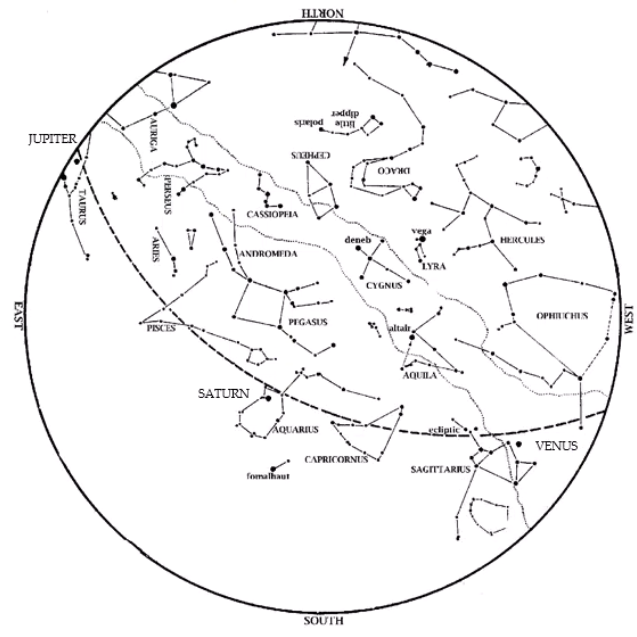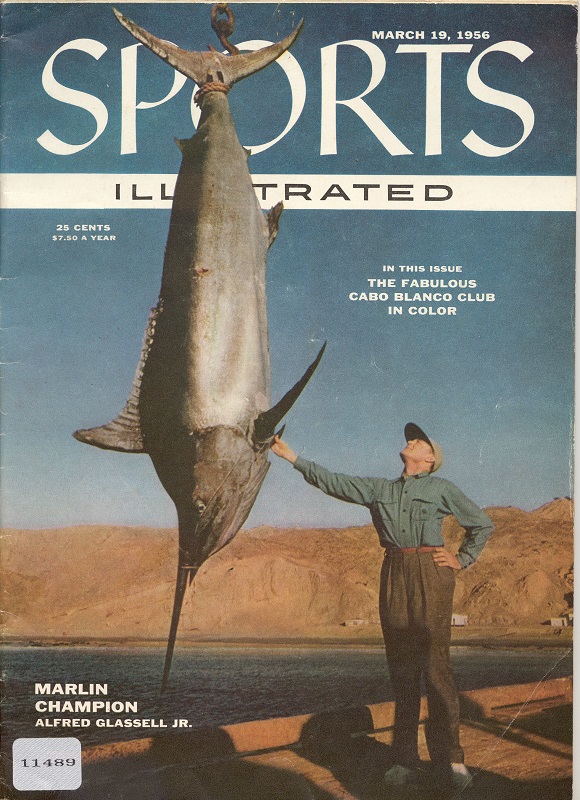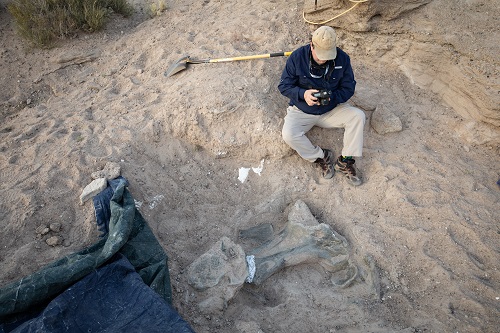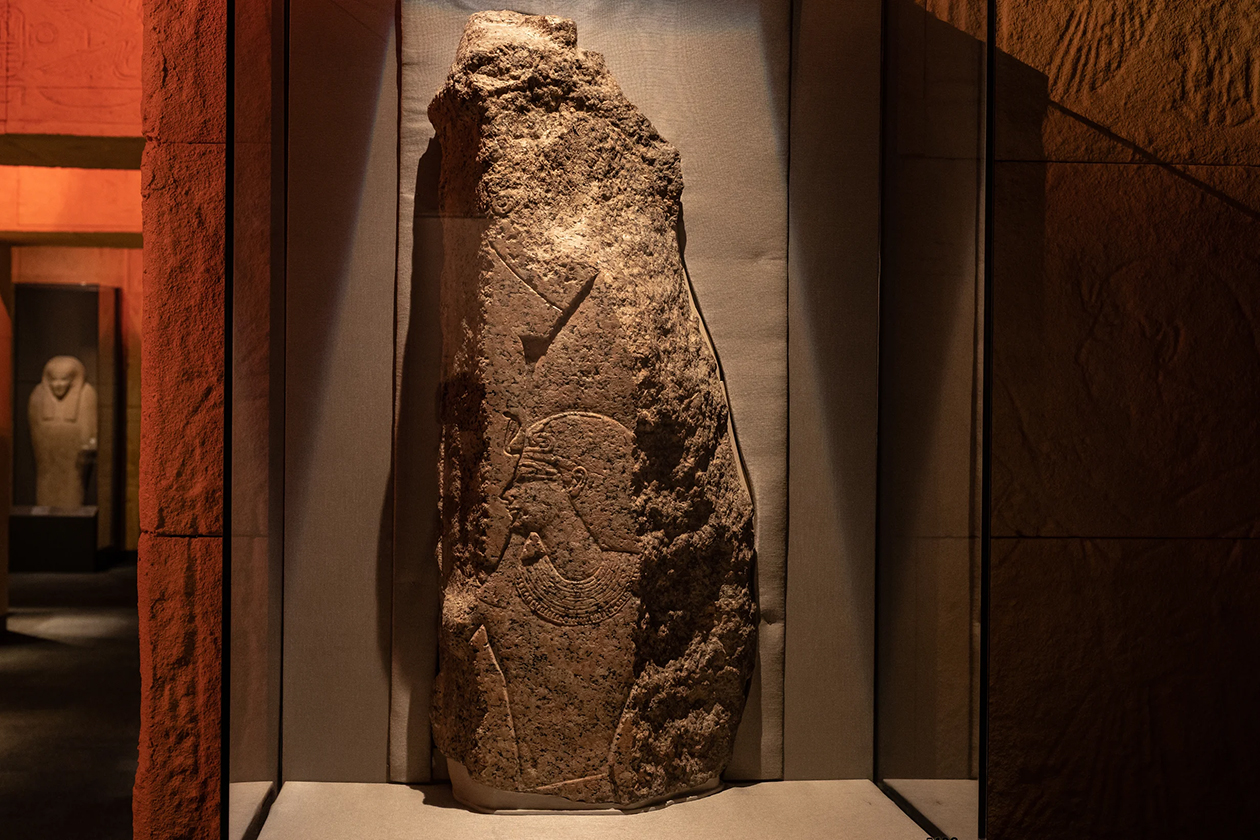Texas has a weird and eclectic history filled with more iconoclastic characters than you can shake a stick at, but in honor of President’s Day I thought I’d put the spotlight on a particularly important character in the grand performance of Texas history: John Tyler.
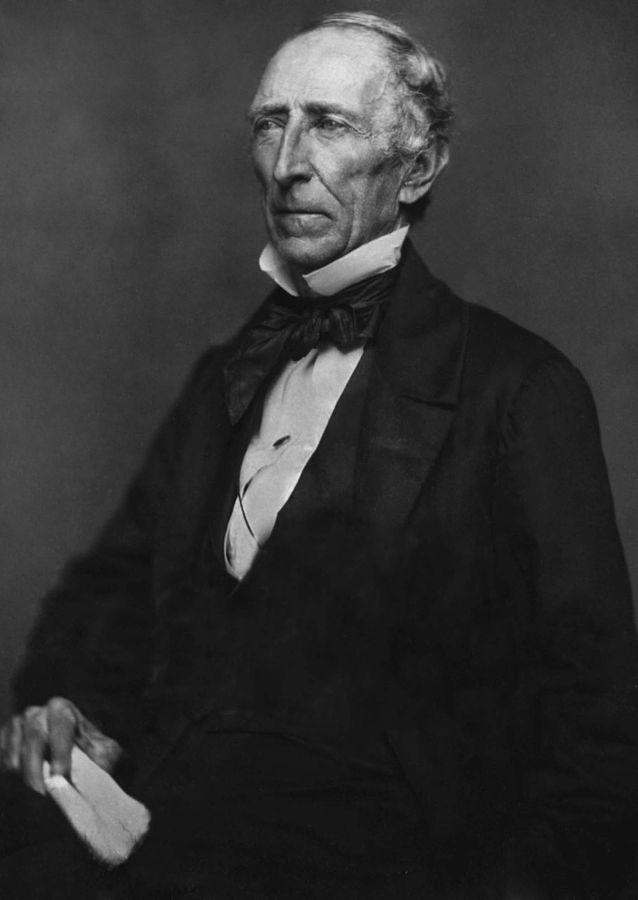
I know what you’re thinking. John who? And that statement pretty much sums up the view most historians have of this president. He’s generally considered to be an ineffectual Commander in Chief whose contributions to our nation’s history were minor. However, he did give us Texas and for that we are grateful. And just because everything else he did while in office was mediocre doesn’t mean that his presidency wasn’t interesting. In fact, his term was a roller coaster ride of drama. We’re going to cover some of the juicy details of his story in today’s edition of Beyond Bones.
John Tyler was born in to a well-to-do Virgina family in 1790. He graduated from the College of William and Mary in 1807 and became a member of the Virginia House of Delegates in 1811 at the age of 21. He was elected governor of Virginia in 1825, resigning from the office (which in Virginia at the time was powerless and practically ceremonial) when he was elected a senator of the state.
The conditions under which he became senator would anticipate the later conditions surrounding his election as Vice President. Incumbent Senator John Randolph’s term was coming to an end and the General Assembly of Virginia was unsure if they should re-elect him (in those days senators were elected by the state legislature). The problem was he was a hot head whose fiery rhetoric had alienated many politicians. However, Randolph’s political views were in agreement with the majority of the assembly and many were reluctant to risk bringing in a new guy. So what happened next? Members of the assembly nominated Tyler on the grounds that “there was no political difference between the two candidates, Tyler was merely more agreeable”. Thus Tyler became a Senator by simply not being as bad as the other guy.
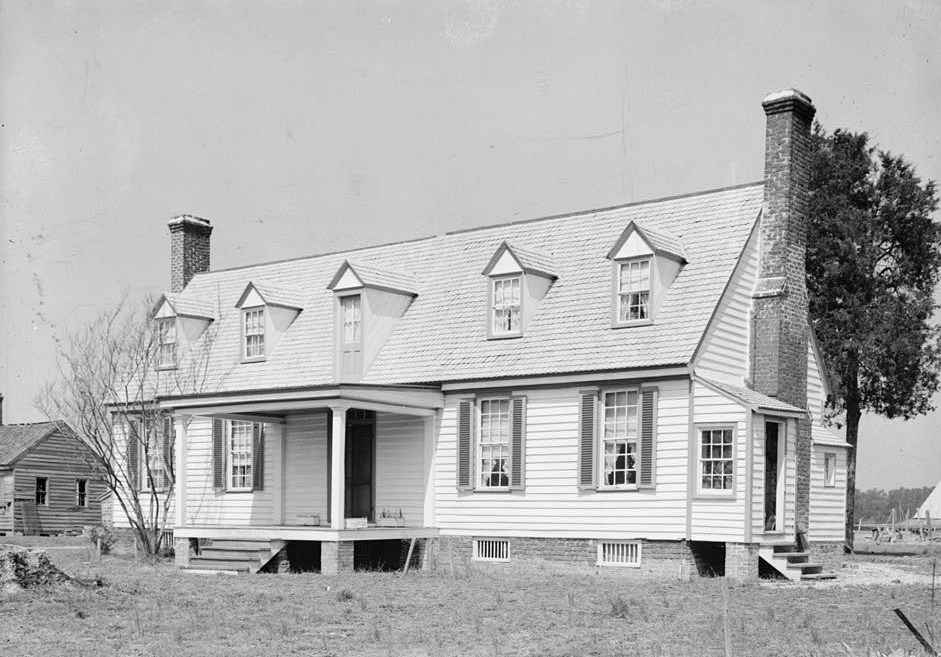
Tyler’s birthplace, Greenway Plantation, Charles City County, VA. Source: Wikimedia Commons.
As a Senator, Tyler made a name for himself by disagreeing with pretty much everything President Andrew Jackson (who was a member of Tyler’s own political party, the Democrats) did. This made most of his fellow Virginia Democrats pretty angry. In 1836 he broke with the party and resigned his position.
A few years later, in 1839, as the Whig party was preparing for the 1841 Presidential election they decided to nominate Tyler for Vice President for reasons that are unclear to this day. According to later testimony by one of the managers for the Whig National Convention that year, Thurlow Weed, “Tyler was finally taken because we could get nobody else to accept”. Apparently mediocrity and being in the right place at the right time were excellent qualities for a politician in the early 19th century. It got Tyler elected to political positions twice. The Whig’s presidential nominee was William Henry Harrison, whose most attractive qualities were his frailty (he was 68 when he became presidency) and his acquiescent personality, all the better for prominent Whig politicians who hoped to control him.
The Whigs were a relatively new party and their members were split into numerous squabbling factions that had splintered off other parties. So to get get everyone united in support of their candidates they instructed Tyler and Harrison to give vague speeches so as not to alienate anyone and plied attendees of political rallies and conventions with alcohol. They also created jaunty tunes like the one linked to below.
In response to all this debauchery, the Democrats, whose candidate was Martin Van Buren, attempted to cast Harrison and Tyler as backwoods yahoos whose only talents were drinking and singing. Unfortunately for the Democrats, the down-home image they cast of their rivals only increased their popularity. You can hear this referenced in the lyrics of the re-mixed Harrison campaign song below.
Thanks to the wild and wooley efforts of the Whig party, Harrison was elected President in 1840. Among the small minority of states lost by the Whigs was Virginia, Tyler’s own state. Apparently there was still bad blood from the Jackson era.
Unfortunately (or fortunately for Tyler and Texas history) Harrison died of pneumonia only 30 days into his presidency. This is where Tyler started making history. Never before had a president died while in office, so what next? Tyler immediately traveled to Washington D.C. and took the Oath of Office. With this decisive action he set the precedent for future generations of Vice Presidents facing the sudden deaths of their Commander in Chief. Seven presidents have died in office since Harrison: Taylor, Lincoln Garfield, Mckinley, Harding, Roosevelt and Kennedy. Thanks to the precedent set by Tyler, all these deaths were succeeded by a peaceful transfer of power to the Vice President.
At the time, however, the nation had never faced such a disaster. Many in Congress resisted Tyler’s claim to the office, arguing that he was not the real president, that he was still the Vice President and thus did not have full presidential authority. But Tyler didn’t care, he simply took charge regardless of what Congress said.
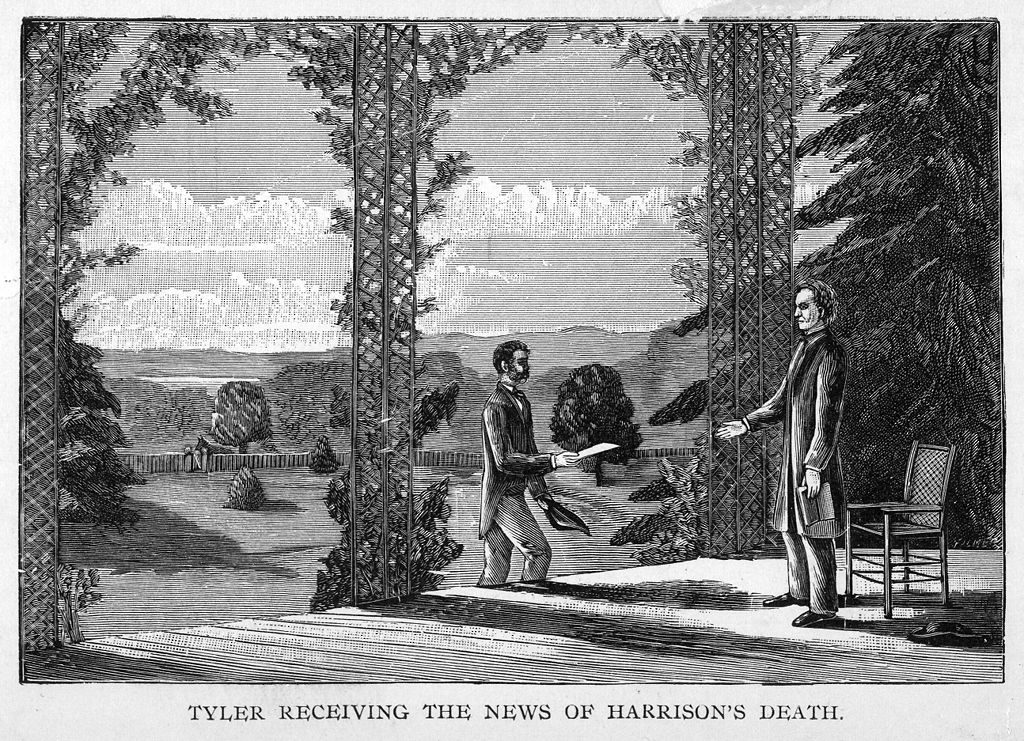
1888 illustration of President Tyler receiving the news of President Harrison’s death from Chief Clerk of the State Department Fletcher Webster.
Source: Wikimedia Commons.
This came as a huge shock to the Whigs. They had hoped to steer the pliable Harrison’s presidency, but now Tyler, who had a reputation as a maverick, was in charge. And in good ‘ol Tyler tradition, he quickly began vetoing his own party’s bills. Nobody was better at alienating political allies than Tyler. Whig politicians began referring to him as “His Accidency”. On September 13, 1841 the Whigs expelled Tyler from their party. Tyler was now a president without a party.
At this point it seemed extremely unlikely that Tyler would win a second term as president, barring him accomplishing something absolutely amazing that would win over voters from both political parties. In comes Texas. Sam Houston had sought annexation by the United States as early as early as late 1836, but the New Republic proved to be too much of a hot potato for then-president Andrew Jackson. The problem was that Texas was a slave state. This was during and era when the expansion of slavery was a major issue. Besides that, annexing Texas would almost certainly lead to war with Mexico.
But despite how hot the Texas potato was, Tyler saw it as his ticket to a second term and he would do anything to get it. In 1843, his last year in office, Tyler began vigorously pursuing his goal of annexing the Lone Star State. He started playing political hardball, He began dismissing Government officials who were against Texas’ annexation, including Secretary of State Daniel Webster, who had just finished settling the contentious issue of the border between the United States and Canada. He began making secret deals with Sam Houston and for once it looked like he was going to rise above mediocrity. Then the U.S.S. Princeton exploded.
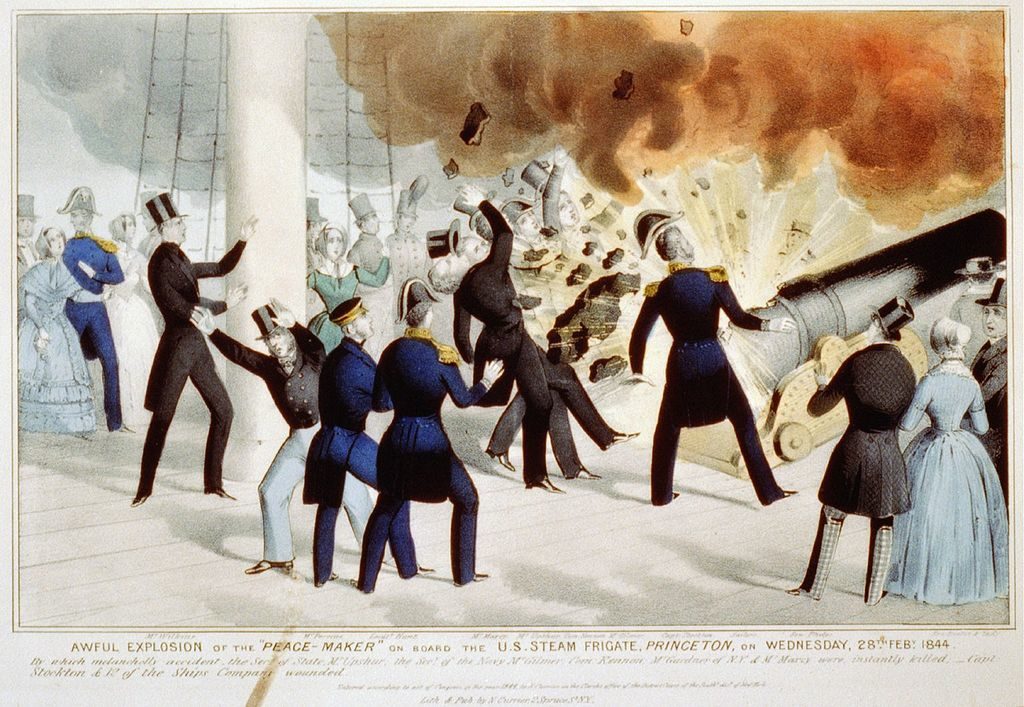
A lithograph of the Princeton disaster (1844). Source: Wikimedia Commons.
On February 28, 1844, the day after the completion of the annexation treaty, President Tyler and many other prominent government officals were aboard the U.S.S. Princeton to celebrate the completion of the new war ship and it its gun, the “Peacemaker” which was the world’s largest naval artillery gun at the time. The gun was ceremoniously fired twice during the festivities. Later in the afternoon, Tyler proposed a third firing. Unfortunately the third attempt proved disastrous. The gun exploded, killing many people, including Secretary of State Abel P. Upshur and State Representative Thomas Walker Gilmer, two vital allies in Tyler’s efforts to annex Texas.
As if things weren’t already bad, in typical Tyler fashion he alienated half the nation by appointing John C. Calhoun, a prominent defender of slavery, to replace Upshur, thus confirming in the eyes of abolitionists their fear that annexing Texas would mean expanding slavery. After that debacle, the chances of getting Congress to approve annexation were non-existent, as were Tyler’s chances of being re-elected.
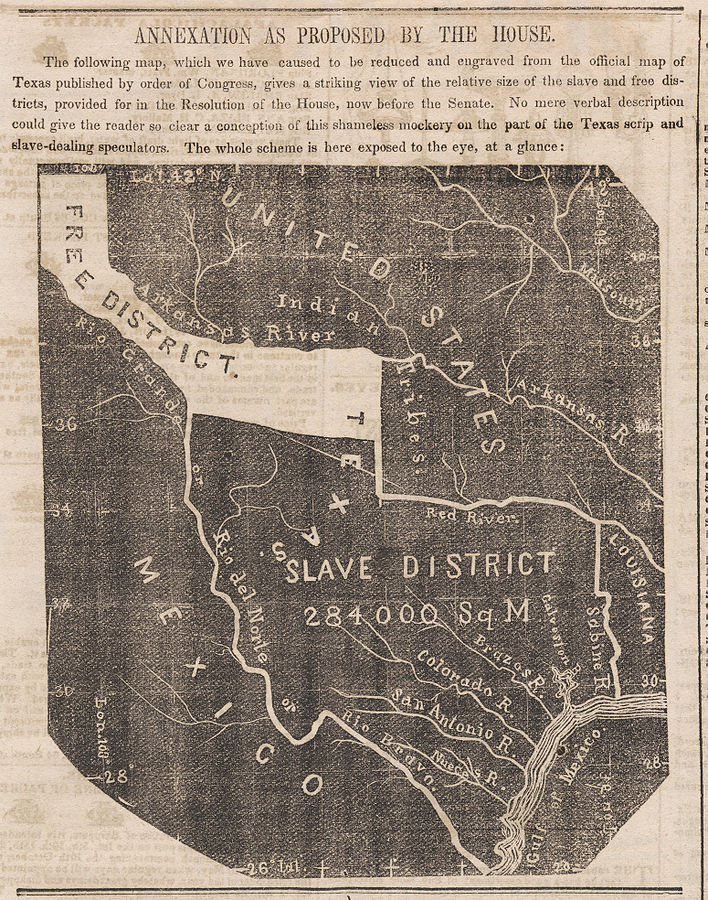
A map, published in the Newark Daily Advertiser as the U.S. Senate was considering a Joint Resolution for the Annexation of Texas that had been adopted by the House of Representatives. Source: Wikimedia Commons.
But it wasn’t over yet, and Tyler wasn’t going down without a fight! He created his own party called the Democratic Republicans and ran for president basically on a platform of “I will give you Texas if you vote for me”. A Tempting offer. In fact, with this promise he drew enough support from the regular Democratic party that they were forced to call for annexation of the state as well in order to get their voters back. With his one redeeming quality taken by the Democrats, Tyler drew out of the race. Shortly before he left office, Texas was annexed.
Tyler may have been a mediocre president who undermined all of his own chances at success, but if if wasn’t for his desperate attempt to win the hearts of Americans (and a second term in office) with his grand gift of Texas who knows how long it would have been before the Lone Star State was admitted to the United States. So who better to honor on President’s day. After all, I’m sure all the good presidents are getting enough attention.
Further Reading:
Revisiting A Piece Of Houston TV History In The HMNS Archives
A Brief History of Fireworks and Why We Pop Them on the 4th of July
Two of the Most Embarrassing Dads in History Whose Stories are Told in Our Exhibits


